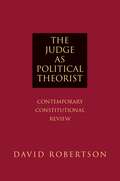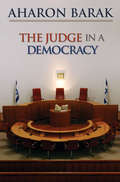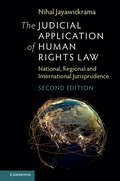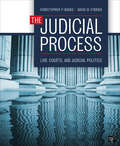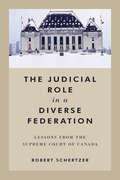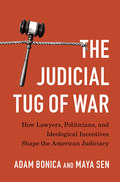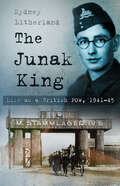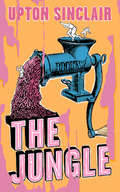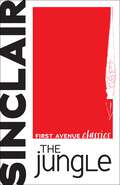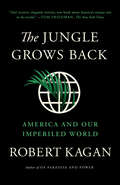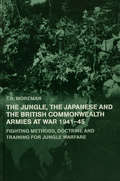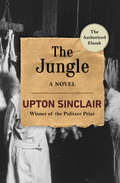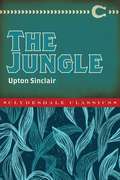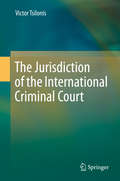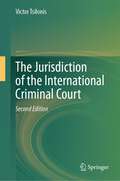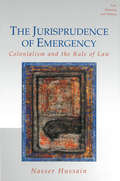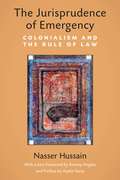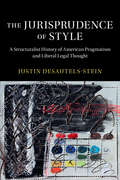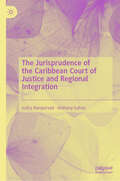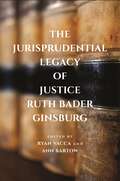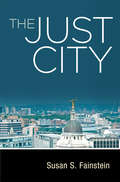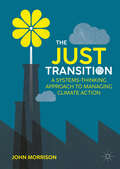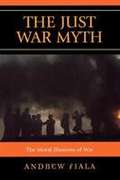- Table View
- List View
The Judge as Political Theorist: Contemporary Constitutional Review
by David RobertsonThe Judge as Political Theorist examines opinions by constitutional courts in liberal democracies to better understand the logic and nature of constitutional review. David Robertson argues that the constitutional judge's role is nothing like that of the legislator or chief executive, or even the ordinary judge. Rather, constitutional judges spell out to society the implications--on the ground--of the moral and practical commitments embodied in the nation's constitution. Constitutional review, in other words, is a form of applied political theory. Robertson takes an in-depth look at constitutional decision making in Germany, France, the Czech Republic, Poland, Hungary, Canada, and South Africa, with comparisons throughout to the United States, where constitutional review originated. He also tackles perhaps the most vexing problem in constitutional law today--how and when to limit the rights of citizens in order to govern. As traditional institutions of moral authority have lost power, constitutional judges have stepped into the breach, radically altering traditional understandings of what courts can and should do. Robertson demonstrates how constitutions are more than mere founding documents laying down the law of the land, but increasingly have become statements of the values and principles a society seeks to embody. Constitutional judges, in turn, see it as their mission to transform those values into political practice and push for state and society to live up to their ideals.
The Judge in a Democracy
by Aharon BarakWhether examining election outcomes, the legal status of terrorism suspects, or if (or how) people can be sentenced to death, a judge in a modern democracy assumes a role that raises some of the most contentious political issues of our day. But do judges even have a role beyond deciding the disputes before them under law? What are the criteria for judging the justices who write opinions for the United States Supreme Court or constitutional courts in other democracies? These are the questions that one of the world's foremost judges and legal theorists, Aharon Barak, poses in this book. In fluent prose, Barak sets forth a powerful vision of the role of the judge. He argues that this role comprises two central elements beyond dispute resolution: bridging the gap between the law and society, and protecting the constitution and democracy. The former involves balancing the need to adapt the law to social change against the need for stability; the latter, judges' ultimate accountability, not to public opinion or to politicians, but to the "internal morality" of democracy. Barak's vigorous support of "purposive interpretation" (interpreting legal texts--for example, statutes and constitutions--in light of their purpose) contrasts sharply with the influential "originalism" advocated by U.S. Supreme Court Justice Antonin Scalia. As he explores these questions, Barak also traces how supreme courts in major democracies have evolved since World War II, and he guides us through many of his own decisions to show how he has tried to put these principles into action, even under the burden of judging on terrorism.
The Judicial Application of Human Rights Law: National, Regional and International Jurisprudence
by Nihal JayawickramaSince the 1948 Universal Declaration of Human Rights, over 140 countries have incorporated human rights standards into their legal systems: the resulting jurisprudence from diverse cultural traditions brings new dimensions to concepts first articulated in the 1948 Declaration. Nihal Jayawickrama draws on all available sources to encapsulate the judicial interpretation of human rights law in one ambitious, comprehensive volume. Jayawickrama covers the case law of the superior courts of over eighty countries in North America, Europe, Africa, Asia, and the Pacific, and the jurisprudence of the UN Human Rights monitoring bodies, the European Court of Human Rights, and of the Inter-American system. He analyses the judicial application of human rights law to demonstrate empirically the universality of contemporary human rights norms. This definitive compendium will be essential for legal practitioners, government and non-governmental officials, as well as academics and students of both constitutional law and the international law of human rights.
The Judicial Process: Law, Courts, and Judicial Politics
by Christopher P. Banks David M. O′BrienThe Judicial Process: Law, Courts, and Judicial Politics is an all-new, concise yet comprehensive core text that introduces students to the nature and significance of the judicial process in the United States and across the globe. It is social scientific in its approach, situating the role of the courts and their impact on public policy within a strong foundation in legal theory, or political jurisprudence, as well as legal scholarship. Authors Christopher P. Banks and David M. O’Brien do not shy away from the politics of the judicial process, and offer unique insight into cutting-edge and highly relevant issues. In its distinctive boxes, "Contemporary Controversies over Courts" and "In Comparative Perspective," the text examines topics such as the dispute pyramid, the law and morality of same-sex marriages, the "hardball politics" of judicial selection, plea bargaining trends, the right to counsel and "pay as you go" justice, judicial decisions limiting the availability of class actions, constitutional courts in Europe, the judicial role in creating major social change, and the role lawyers, juries and alternative dispute resolution techniques play in the U.S. and throughout the world. Photos, cartoons, charts, and graphs are used throughout the text to facilitate student learning and highlight key aspects of the judicial process.
The Judicial Process: Law, Courts, and Judicial Politics
by Christopher P. Banks David M. O′BrienThe Judicial Process: Law, Courts, and Judicial Politics is an all-new, concise yet comprehensive core text that introduces students to the nature and significance of the judicial process in the United States and across the globe. It is social scientific in its approach, situating the role of the courts and their impact on public policy within a strong foundation in legal theory, or political jurisprudence, as well as legal scholarship. Authors Christopher P. Banks and David M. O’Brien do not shy away from the politics of the judicial process, and offer unique insight into cutting-edge and highly relevant issues. In its distinctive boxes, "Contemporary Controversies over Courts" and "In Comparative Perspective," the text examines topics such as the dispute pyramid, the law and morality of same-sex marriages, the "hardball politics" of judicial selection, plea bargaining trends, the right to counsel and "pay as you go" justice, judicial decisions limiting the availability of class actions, constitutional courts in Europe, the judicial role in creating major social change, and the role lawyers, juries and alternative dispute resolution techniques play in the U.S. and throughout the world. Photos, cartoons, charts, and graphs are used throughout the text to facilitate student learning and highlight key aspects of the judicial process.
The Judicial Role in a Diverse Federation: Lessons from the Supreme Court of Canada
by Robert SchertzerIn The Judicial Role in a Diverse Federation, Robert Schertzer uses the example of the Supreme Court of Canada to examine how apex courts manage diversity and conflict in federal states.Schertzer argues that in a diverse federation where the nature of the federal system is contested the courts should facilitate negotiation between conflicting parties, rather than impose their own vision of the federal system. Drawing on a comprehensive review of the Supreme Court federalism jurisprudence between 1980 and 2010, he demonstrates that the court has increasingly adopted this approach of facilitating negotiation by acknowledging the legitimacy of different understandings of the Canadian federation.This book will be required reading both for those interested in Canada's Supreme Court and for those engaged in broader debates about the use of federalism in multinational states.
The Judicial Tug of War: How Lawyers, Politicians, and Ideological Incentives Shape the American Judiciary (Political Economy of Institutions and Decisions)
by Maya Sen Adam BonicaWhy have conservatives decried 'activist judges'? And why have liberals - and America's powerful legal establishment - emphasized qualifications and experience over ideology? This transformative text tackles these questions with a new framework for thinking about the nation's courts, 'the judicial tug of war', which not only explains current political clashes over America's courts, but also powerfully predicts the composition of courts moving forward. As the text demonstrates through novel quantitative analyses, a greater ideological rift between politicians and legal elites leads politicians to adopt measures that put ideology and politics front and center - for example, judicial elections. On the other hand, ideological closeness between politicians and the legal establishment leads legal elites to have significant influence on the selection of judges. Ultimately, the judicial tug of war makes one point clear: for good or bad, politics are critical to how judges are selected and whose interests they ultimately represent.
The Junak King: Life as a British POW, 1941-45
by Sydney LitherlandSydney Litherland, at the age of 20, was called up in February 1940. After having been evacuated from Greece, he was among the 30,000 British and Commonwealth soldiers taken prisoner by the Germans at the fall of Crete in June 1941. This book documents in fascinating and historically important detail their daily life as POWs in Germany and encapsulates the experiences of tens of thousands of ordinary POWs. The German airborne invasion of Crete and the surrender by the British is still the subject of controversy. Sydney gives here his own first-hand account of the event. This is not an account of heroic escapes and derring-do by dashing officers, but of the day-to-day endurance of the other ranks, mostly very young men, separated from their officers and expected to do hard manual labour in working camps. What is revealed is a different kind of courage: a quiet resilience and dogged determination not just to endure, but to triumph. Supporting each other, they never lose hope of eventual victory or let an opportunity slip to make life more difficult for their captors. This is an enthralling record of their triumphs and tragedies over four long years.
The Jungle
by Upton Sinclair Eric Schlosser Jonathan Beecher Field Ronald GottesmanUpton Sinclair's dramatic and deeply moving story exposed the brutal conditions in the Chicago stockyards at the turn of the nineteenth century and brought into sharp moral focus the appalling odds against which immigrants and other working people struggled for their share of the American dream. Denounced by the conservative press as an un-American libel on the meatpacking industry, the book was championed by more progressive thinkers, including then President Theodore Roosevelt, and was a major catalyst to the passing of the Pure Food and Meat Inspection act, which has tremendous impact to this day.Enriched eBook Features Editor Jonathan Beecher Field provides the following specially commissioned features for this Enriched eBook Classic:* Chronology* Filmography (and the 1914 The Jungle Film Poster)* Early Twentieth-Century Reviews of The Jungle* Suggestions for Further Reading* The Jungle and the Pure Food and Drug Act of 1906* The Jungle Book Cover Designs* Federal Food and Drugs Act of 1906* Immigrants and the Meatpacking Industry, Then and Now* Images of the Chicago Stockyards* Images of Cuts of Beef and Pork* Enriched eBook NotesThe enriched eBook format invites readers to go beyond the pages of these beloved works and gain more insight into the life and times of an author and the period in which the book was originally written for a rich reading experience.
The Jungle (Dover Thrift Editions Series)
by Upton SinclairUpton Sinclair's dramatic and deeply moving story exposed the brutal conditions in the Chicago stockyards at the turn of the nineteenth century and brought into sharp moral focus the apalling odds against which immigrants and other working people struggled for their share of the American dream. Denounced by the conservative press as an un-American libel on the meatpacking industry, The Jungle was championed by more progressive thinkers, including then president Theodore Roosevelt, and was a major catalyst to the passing of the Pure Food and Meat Inspection act, which has tremendous impact to this day.Penguin Random House Canada is proud to bring you classic works of literature in e-book form, with the highest quality production values. Find more today and rediscover books you never knew you loved.
The Jungle (First Avenue Classics ™)
by Upton SinclairJurgis and his family move to Chicago from Lithuania to find a better life. But what they find instead are abysmal working conditions, corrupt legal systems, and chronic poverty. The family gets jobs in Chicago's meatpacking district, Packingtown, and works long hours for low pay. Jurgis is injured on the job and isn't given workers' compensation. His wife is raped by her boss and forced into prostitution. As his family suffers through hardship after hardship, Jurgis wonders if bringing them to America was a huge mistake. First published in 1906, this is an unabridged version of Upton Sinclair's muckraking novel criticizing the exploitation of Chicago's immigrants. The horrifying descriptions of the health violations of the early 20th century meatpacking industry inspired the groundwork legislation for today's Food and Drug Administration.
The Jungle Grows Back: America and Our Imperiled World
by Robert KaganA brilliant and visionary argument for America's role as an enforcer of peace and order throughout the world--and what is likely to happen if we withdraw and focus our attention inward.Recent years have brought deeply disturbing developments around the globe. American sentiment seems to be leaning increasingly toward withdrawal in the face of such disarray. In this powerful, urgent essay, Robert Kagan elucidates the reasons why American withdrawal would be the worst possible response, based as it is on a fundamental and dangerous misreading of the world. Like a jungle that keeps growing back after being cut down, the world has always been full of dangerous actors who, left unchecked, possess the desire and ability to make things worse. Kagan makes clear how the "realist" impulse to recognize our limitations and focus on our failures misunderstands the essential role America has played for decades in keeping the world's worst instability in check. A true realism, he argues, is based on the understanding that the historical norm has always been toward chaos--that the jungle will grow back, if we let it.
The Jungle, Japanese and the British Commonwealth Armies at War, 1941-45: Fighting Methods, Doctrine and Training for Jungle Warfare (Military History and Policy)
by Tim MoremanThis book focuses on the British Commonwealth armies in SE Asia and the SW Pacific during the Second World War, which, following the disastrous Malayan and Burma campaigns, had to hurriedly re-train, re-equip and re-organise their demoralised troops to fight a conventional jungle war against the Imperial Japanese Army (IJA). British, Indian and Australian troops faced formidable problems conducting operations across inaccessible, rugged and jungle-covered mountains on the borders of Burma, in New Guinea and on the islands of the SW Pacific. Yet within a remarkably short time they adapted to the exigencies of conventional jungle warfare and later inflicted shattering defeats on the Japanese. This study will trace how the military effectiveness of the Australian Army and the last great imperial British Army in SE Asia was so dramatically transformed, with particular attention to the two key factors of tactical doctrine and specialised training in jungle warfare. It will closely examine how lessons were learnt and passed on between the British, Indian and Australian armies. The book will also briefly cover the various changes in military organisation, medical support and equipment introduced by the military authorities in SE Asia and Australia, as well as covering the techniques evolved to deliver effective air support to ground troops. To demonstrate the importance of these changes, the battlefield performance of imperial troops in such contrasting operations as the First Arakan Campaign, fighting along the Kokoda Trail and the defeat of the IJA at Imphal and Kohima will be described in detail.
The Jungle: A Novel (The Best Sellers Of 1906 Series)
by Upton SinclairThe classic protest novel that exposed harsh working conditions and unsanitary practices in the meatpacking industry A slaughterhouse worker from Lithuania, Jurgis Rudkus immigrated to turn-of-the-century Chicago believing that he would find freedom and prosperity. Instead, meager wages and a filthy, dangerous workplace drive him deep into debt and despair. Victimized, abused, and utterly alone, Jurgis and his wife, Ona, face a lifetime of never-ending struggle in a merciless urban jungle. An extraordinary work of fiction based in cold, hard fact, The Jungle is one of the most influential novels ever written. Privately published in 1906, it quickly became an international bestseller, inspiring sweeping and essential changes, including the passage of the Pure Food and Drug Act. Powerful and provocative, poignant and horrifying, The Jungle is Upton Sinclair's masterwork. This ebook has been authorized by the estate of Upton Sinclair.
The Jungle: Webster's Thesaurus Edition (Clydesdale Classics)
by Upton SinclairPackaged in handsome, affordable trade editions, Clydesdale Classics is a new series of essential literary works. It features literary phenomena with influence and themes so great that, after their publication, they changed literature forever. From the musings of literary geniuses such as Nathaniel Hawthorne in The Scarlet Letter, to the striking personal narratives from Harriet Jacobs in Incidents in the Life of a Slave Girl, this new series is a comprehensive collection of our history through the words of the exceptional few.Set in Chicago during the early 1900s, Upton Sinclair’s The Jungle portrays the hardships of the immigrant working class. The story begins with Lithuanian immigrant Jurgis Rudkus, who takes a job at Brown’s slaughterhouse to try to earn enough money to stay afloat. His life becomes a constant struggle-he, his young wife, Ona, and the rest of his family eventually falling victim to a slew of unfortunate circumstances including exploitation, abuse, and for some even death.From unsanitary and unsafe working conditions to poverty wages, the novel revealed to the American public the struggles immigrants encountered in Chicago’s meatpacking industry. Sinclair, a muckraking journalist, penned the bestselling narrative in an attempt to expose the evils of capitalism, and bring to light the extreme adversity these people faced not just in Chicago, but in industrialized cities across the country. By detailing numerous health violations in these workplaces, Sinclair’s novel caused public outrage and eventually led to the passing of the Meat Inspection Act and the Pure Food and Drug Act.The Jungle is an honest, sometimes brutal, tour de force that opened America’s eyes to the struggles and horrors many immigrants endured.
The Jurisdiction of the International Criminal Court
by Victor TsilonisThe book provides a holistic examination of the jurisdiction of the International Criminal Court (ICC). The main focus is placed on the three pillars which form the ICC’s foundation pursuant to the Rome Statute:the preconditions to the exercise of its jurisdiction (Article 12 Rome Statute)the substantive competence, i.e. the core crimes (Article 5-8bis Rome Statute, i.e. genocide, crimes against humanity, war crimes, crime of aggression) the principle of complementarity (Article 17§1 (a) Rome Statute) The latter governs the ICC's ‘ultimate jurisdiction’, since it is not merely sufficient for a crime to be within the Court's jurisdiction (according to the substantive, geographical, personal and temporal jurisdictional criteria), but the State Party must also be unwilling or unable genuinely to carry out the investigation or prosecution. Finally yet importantly, the main ‘negative preconditions’ for the Court’s jurisdiction, i.e. immunities (Article 27 Rome Statute) and exceptions via Security Council referrals are thoroughly examined.The book is an excellent resource for scholars as well as practitioners and notably contributes to the existing literature.
The Jurisdiction of the International Criminal Court
by Victor TsilonisThis book embarks on a comprehensive exploration of the jurisdiction of the International Criminal Court (ICC) and elucidates the three foundational aspects of its jurisdiction as laid out in the Rome Statute: the preconditions for exercising jurisdiction (Article 12 ICCRSt), its substantive competence regarding core crimes (Articles 5-8bis ICCRSt), and the principle of complementarity (Article 17§1(a) ICCRSt).This principle, crucial to understanding the ICC’s ‘ultimate jurisdiction’, is invoked only when a State Party demonstrates an inability or unwillingness to genuinely undertake investigation or prosecution. The book further probes the ‘negative preconditions’ of the Court’s jurisdiction, in particular, immunities (Article 27 ICCRSt) and exceptions through Security Council referrals (Articles 13(b) and 15 ICCRSt).Intended for students, scholars, and practitioners alike, this second edition offers invaluable insights into the ICC’s jurisdiction, making a notable contribution to the existing literature. Importantly, it also navigates emerging fields of international criminal law, addressing topical and thought-provoking subjects such as ecocide, cyber warfare, automated lethal weapons, artificial intelligence, and the legal complexities arising from the Russian invasion of Ukraine.
The Jurisprudence of Emergency
by Nasser HussainHussain analyses the uses and the history of a range of emergency powers, such as the suspension of habeas corpus and the use of military tribunals. His study focuses on British colonialism in India from the late eighteenth to the early twentieth century to demonstrate how questions of law and emergency shaped colonial rule, which in turn affected the place of colonialism in modern law, depicting the colonies not as passive recipients but as agents in the interpretation and delineation of Western ideas and practices. Nasser Hussain is Professor of History at Amherst College.
The Jurisprudence of Emergency: Colonialism and the Rule of Law (Law, Meaning, And Violence)
by Nasser HussainThe Jurisprudence of Emergency examines British rule in India from the late eighteenth to the early twentieth century, tracing tensions between the ideology of liberty and government by law used to justify the colonizing power's insistence on a regime of conquest. Nasser Hussain argues that the interaction of these competing ideologies exemplifies a conflict central to all Western legal systems—between the universal, rational operation of law on the one hand and the absolute sovereignty of the state on the other. The author uses an impressive array of historical evidence to demonstrate how questions of law and emergency shaped colonial rule, which in turn affected the development of Western legality. The pathbreaking insights developed in The Jurisprudence of Emergency reevaluate the place of colonialism in modern law by depicting the colonies as influential agents in the interpretation of Western ideas and practices. Hussain's interdisciplinary approach and subtly shaded revelations will be of interest to historians as well as scholars of legal and political theory.
The Jurisprudence of Style: A Structuralist History Of American Pragmatism And Liberal Legal Thought (Cambridge Historical Studies In American Law And Society Series)
by Justin Desautels-SteinIn the contemporary domain of American legal thought there is a dominant way in which lawyers and judges craft their argumentative practice. More colloquially, this is a dominant conception of what it means to 'think like a lawyer'. Despite the widespread popularity of this conception, it is rarely described in detail or given a name. Justin Desautels-Stein tells the story of how and why this happened, and why it matters. Drawing upon and updating the work of Harvard Law School's first generation of critical legal studies, Desautels-Stein develops what he calls a jurisprudence of style. In doing so, he uncovers the intellectual alliance, first emerging at the end of the nineteenth century and maturing in the last third of the twentieth century, between American pragmatism and liberal legal thought. Applying the tools of legal structuralism and phenomenology to real-world cases in areas of contemporary legal debate, this book develops a practice-oriented understanding of legal thought.
The Jurisprudence of the Caribbean Court of Justice and Regional Integration
by Indira Rampersad Anthony GafoorThe book is a joint publication with equal contributions by Dr. Indira Rampersad and Justice Dr. Anthony Gafoor. It presents the first comprehensive analysis of the jurisprudence of the Caribbean Court of Justice in both its original and appellate jurisdictions from 2005 to 2020. It seeks to address the central issue of whether the jurisprudence of the CCJ has the capacity to foster regional integration. Through a series of semi-structured interviews, primary and secondary sources, the book harnesses the dynamic interplay between the disciplines of International Relations and Law. It claims that by attempting to uphold the rule of law and promote both economic and non-economic forms of the second generation regional integration, the CCJ aims to inculcate a sense of obligation among member states to uphold both economic agreements and non-economic community rights and values.
The Jurisprudential Legacy of Justice Ruth Bader Ginsburg
by Ryan Vacca Ann BartowProvides a sweeping overview of Justice Ginsburg’s jurisprudenceThe passing of Justice Ruth Bader Ginsburg in September of 2020 marked a grim day for women and the broader progressive legal community. In her twenty-seven years on the Supreme Court and thirteen years on the Court of Appeals, she was most known for her trailblazing work on gender equality; however, she also influenced the direction of a multitude of legal subject areas during her long tenure. The Jurisprudential Legacy of Justice Ruth Bader Ginsburg is a critical examination of Justice Ginsburg’s remarkable career, with a focus on the common themes and approaches underscoring her many rulings.In this edited volume, Ryan Vacca and Ann Bartow bring together leading scholars of American law to analyze Justice Ginsburg’s voting patterns and written opinions from the perspectives of subject matter experts. Each essay highlights areas of the law in which Justice Ginsburg had an outsized interest or impact. Chapters delve into topics such as gender equality, voting rights, the death penalty, civil and criminal procedure, employment discrimination, freedom of expression, bankruptcy, environmental law, immigration, and taxation. Together, they form a colorful tapestry that illustrates a long and celebrated judicial career, displaying Ginsburg’s immense influence on areas of the law well beyond women’s rights.The Jurisprudential Legacy of Justice Ruth Bader Ginsburg shares profound insights into its subject’s unique legal philosophy, and reminds us what we had and whom we lost with her passing.
The Just City
by Susan S. FainsteinFor much of the twentieth century improvement in the situation of disadvantaged communities was a focus for urban planning and policy. Yet over the past three decades the ideological triumph of neoliberalism has caused the allocation of spatial, political, economic, and financial resources to favor economic growth at the expense of wider social benefits. Susan Fainstein's concept of the "just city" encourages planners and policymakers to embrace a different approach to urban development. Her objective is to combine progressive city planners' earlier focus on equity and material well-being with considerations of diversity and participation so as to foster a better quality of urban life within the context of a global capitalist political economy. Fainstein applies theoretical concepts about justice developed by contemporary philosophers to the concrete problems faced by urban planners and policymakers and argues that, despite structural obstacles, meaningful reform can be achieved at the local level.In the first half of The Just City, Fainstein draws on the work of John Rawls, Martha Nussbaum, Iris Marion Young, Nancy Fraser, and others to develop an approach to justice relevant to twenty-first-century cities, one that incorporates three central concepts: diversity, democracy, and equity. In the book's second half, Fainstein tests her ideas through case studies of New York, London, and Amsterdam by evaluating their postwar programs for housing and development in relation to the three norms. She concludes by identifying a set of specific criteria for urban planners and policymakers to consider when developing programs to assure greater justice in both the process of their formulation and their effects.
The Just Transition: A Systems-Thinking Approach To Managing Climate Action
by John MorrisonManaging the climate transition will be one of the biggest challenges ever faced by business and government. While the technical and financial elements of climate transition are vast, the social challenges are even greater. If local populations and workers feel the transitions are not “just” they will resist, and that social opposition now represents one of the greatest barriers to reaching Net Zero by 2050. While the phrase ‘Just Transition’ was in the preamble to the 2015 Paris Climate Agreement, it is only now that business, finance and governments are starting to discuss what this might mean in practice. Thousands of companies are now starting to develop transition plans alongside those of governments. This book shows how all managers can best integrate social elements into these plans, consult with the people most affected by the transition out of the high carbon economy, and ensure that what looks good on paper works in practice. It takes a systems-thinking approach, focusing on the interconnections and interdependence of environmental, social and governance issues. The challenge is immense, and the changes will need to be profound. Each chapter in the book will look at the main domains in which management and policy challenges will be faced. From massively increasing the extraction of rare earth metals, most of which sit below, or adjacent to, indigenous land, to building the infrastructure needed to generate and distribute green energy, possibly over “Not in My Back Yard’ objections, the task of business and government in ensuring that these changes are fair, and perceived as fair, is immense. This book provides the roadmap for how to get there. Managing the social impacts of the climate transition will be one of the biggest challenges ever faced by business and government.
The Just War Myth: The Moral Illusions of War
by Andrew FialaThe Just War Myth argues that while the just war theory is a good theory, actual wars do not live up to its standards. The book provides a genealogy of the just war idea and also turns a critical eye on current events, including the idea of preemptive war, the use of torture, and the unreality of the Bush Doctrine. Fiala warns that pacifism, too, can become mythological, advocating skepticism about attempts to justify war.
